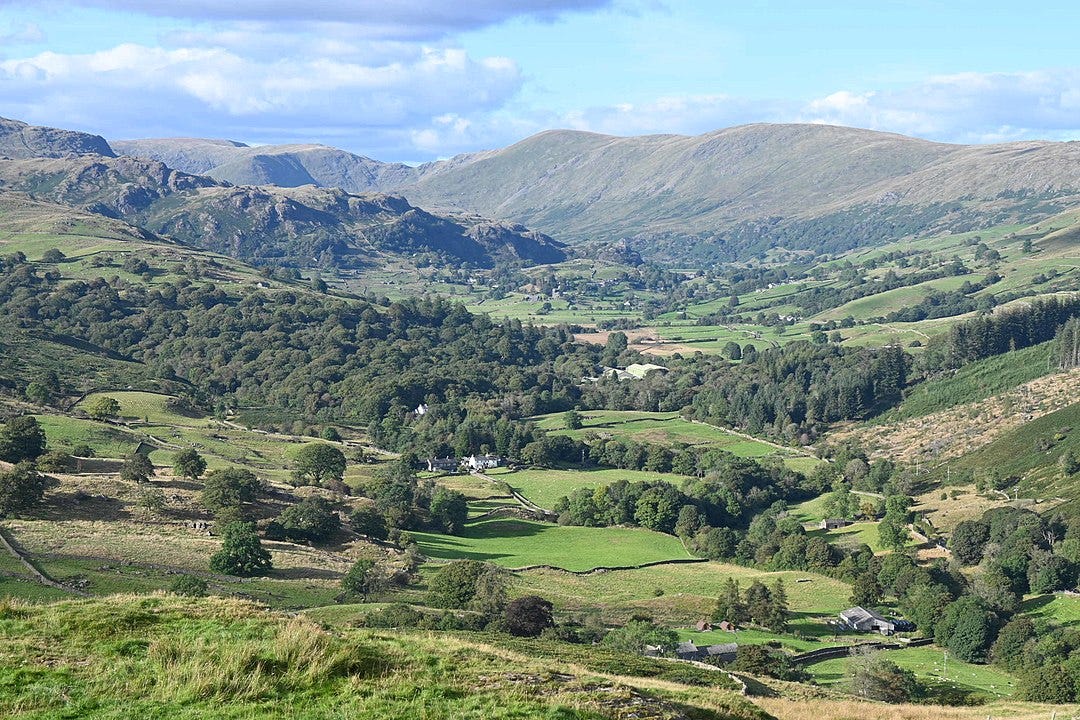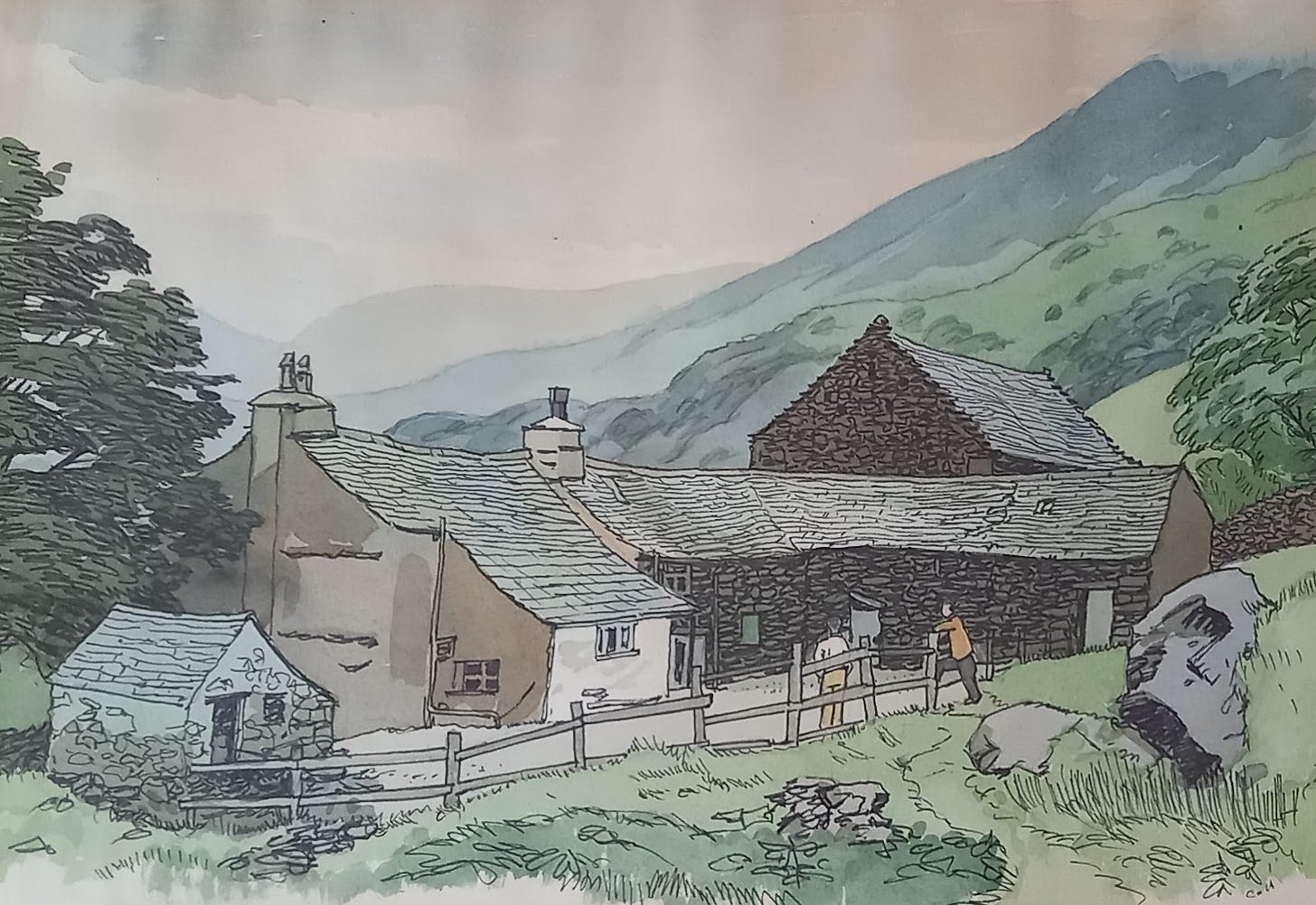When we were young, my family spent holidays in the last house but one at the end of the Kentmere Valley in England’s Lake District. (Invisible here, it stands on the right at the back of the photograph, just below the very far line of forest.)
We had a basset hound who would get stuck on a scent and lope over the fells in pursuit of a hare. After an hour or two, the farmer in the neighbouring valley would phone us to report the dog’s arrival and demand we come and collect him. While his valley was only 5 miles away as the crow flew, by car it was a winding 25 miles. We quickly learned to leash the dog.
My father and the basset had a nightly ritual. (Warning: Intimate detail follows.) The cottage was surrounded by a gravelled terrace. On the valley side, it fell four feet into the pasture below where a pair of hazel trees were planted. At night, with no town-lights pollution, the sky turned pitch black, pierced by stars as though a generous hand had flung glinting diamonds across velvet. Last thing before bed, my father would open the kitchen door and he and the basset would go into the cold to stand side by side on the edge of the terrace, their backs to the cottage. Some mutual understanding would pass between them and simultaneously the basset would lift his leg, my father unzip, and both communicate with nature. Basset, a fine hound, believed in comfort. Father, a fine gardener, believed in the power of urine as a fertilizer.
He is not alone among gardeners, who regularly pee on their compost heaps and dilute their dogs’ urine for a free method of creating bright green lawns.
Now a French start-up is following suit.
Toopi Organics is aiming to replace chemical fertilizers with human urine. Don’t poo-poo this idea (sorry). Urine is naturally rich in nitrogen, phosphorus, potassium and other growth factors. Chemical fertilizers, used to excess in farming, are linked to damaging effects on biodiversity, the environment and our health. Alexandra Carpentier, the CEO of Toopi (a clever name if you think it in French), asserts “Recycling urine could save the world”.
The company collects it from places where people pee a good deal, like petrol stations, schools, and music festivals, all within a close radius of its plant near Bordeaux. After a patented fermentation process, the bacteria is concentrated into a liquid that can be spread directly on the ground.
Carpentier wants to make it clear that their product isn’t for use as a fertilizer, but as an excellent growth medium “for micro-organisms of agronomic interest”.
That kind of science-speak is way beyond my pay grade, although I assume it means it renders fertilizer unnecessary, so I’ll park that information there - except to add that apparently they can produce a quarter of a million litres of this bio-stimulant a year.
Given that urine is essentially an unlimited resource, the company could collect any amount. For instance, you may be interested to know - for a pub quiz, perhaps - that each year, 240 billion litres of urine are discharged by the citizens of Europe alone.
With COP27 trying to reign in climate change, we shouldn’t turn our noses up at this (although I remember the adverse effect on fish of the antibiotics and oestrogens in our urine flushed into sewers debouching into the sea that we once read about regularly). So far, the product has been approved by six European countries. Not only is this a good deal cheaper for farmers than synthetic fertilizers, but a natural solution.
‘Natural’ is a word frequently bandied about, particularly on food products in the US. When used in food labelling, the Food & Drug Administration considers ‘natural’ means that nothing artificial or synthetic (including all colour additives) has been added to a food that would not normally be expected to be in that food.
The FDA didn’t consider whether the term ‘natural’ had to describe any nutritional or other health benefit. And the regulation doesn’t cover production methods, such as the use of pesticides. Nor does it address food processing or manufacturing methods, such as thermal technologies, pasteurisation, or irradiation which, given our advances in alternative meat and dairy production, is significant.
In UK and EU law, there is no legal definition of the term at all. Any statement claiming “100 percent natural”, “all natural ingredients” or “all natural colours”, is up to you to interpret whichever way makes you feel comfortable.
The guidance - informal and non-binding - of the UK’s Food Standards Agency (FSA) says: “‘Natural’ means...that the product is comprised of natural ingredients, e.g. ingredients produced by nature, not the work of man or interfered with by man. It is misleading to use the term to describe foods or ingredients that employ chemicals to change their composition or comprise the products of new technologies, including additives and flavourings that are the product of the chemical industry or extracted by chemical processes.”
So what are we to make of the technologically- or biologically-produced food now coming to market? It’s identical to real dairy proteins and real meat yet grown in labs from animal stem cells. The products they mimic are natural. But can these alternatives be labelled ‘natural’?
This pea soup (a reprehensible pun to circle back to the start of this story) is definitely natural. It’s made not with fresh peas but with dried marrowfat peas. These are regular garden peas that aren't harvested while young but are left in the fields to dry out naturally in the field. They are starchy, and are the peas behind wasabi peas and the mushy peas served with authentic fish and chips. For any recipe, they need to be soaked.
There’s a surprising history behind pea soup. It is established as common at least as far back as 414 BC because that’s the date Aristophanes presented his comedy of Athenian politics, The Birds, in which he mentions the soup.
It’s more likely that you associate this comforting soup with the Dutch, who recorded it in 1768 and who commonly call it ‘snert’. The word is probably Friesian, a northern province of the Netherlands, although “to take a sneirt” or “snars” means to take a swig. The soup is so thick it’s hard to imagine what that would sound like. For a vegetarian version, just leave out all the meats.
Serves 6-8
This is so much better if you make it a 2-day job for the flavours to mellow, though you could do it in one.
1 lb split green peas, soaked overnight
2 leeks, cleaned and chopped1 ham hock, or knuckle of green bacon, soaked overnight
1 pig’s trotter (foot, available at Chinese supermarkets), optional
2 medium onions, roughly chopped
2 leeks, white part only, cleaned and chopped
2-3 sticks of celery, chopped
salt and fresh ground black pepper to taste (checking first as the ham hock may have added enough salt)
1 smoked sausage (optional)
Add the drained peas to a large saucepan and cover with 3½ litres/6 pints water. Simmer, covered, without salt 1-2 hours. Add the ham hock or bacon and pig’s trotter and simmer 2 hours more. In a separate pan, soften the fresh vegetables in the melted butter.
Remove the hock, bacon, trotter to a separate plate and blitz the soup in a liquidizer. Return it to the cleaned saucepan. Add the softened vegetables and cook another hour or more over very low heat with the lid on askew. Stir every now and then to prevent it from catching. Leave, covered, overnight.
Next day, throw out the pig’s trotter, thoroughly chop the meat from the other bones. Gently heat the soup, which will have solidified, adding more water if necessary. Add the meat to warm through.
In a separate pan, add a small amount of vegetable oil and fry up the sausage till lightly browned all over, slice thickly, add to the soup and serve. Or ladle the soup into warmed bowls and then add the sausage.










Wonderfully written, informative new offering!!!
The pun...